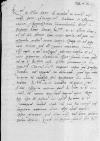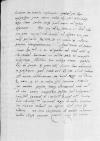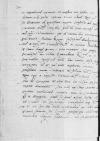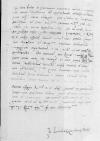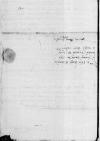Accepi in ⌊Hispaniis⌋ binas litteras Reverendissimae Dominationis Vestrae, ⌊⌋ datas ad me XI, ⌊⌋ vero XXI Aprilis. Ad quas nunc respondeo ordine tamen inverso. Itaque, ut ad ⌊⌋ veniam, quae de ⌊Ioanna⌋ mentionem faciunt, ubi cupit a me intelligere, quisnam artifex et ad cuius instantiam depinxerit illius simulacrum, quod ad Dominationem Vestram Reverendissimam misi. Pictor Germanus est et ⌊sacratissimae caesareae maiestatis⌋ corporis custos, qui praefatam ⌊Ioannam⌋ me rogante ita deliniavit. Quod ego animo hidden by binding⌈[o]o hidden by binding⌉ sincero et candido feci existimans hoc meum studium Reverendissimae Dominationi Vestrae iucundum et gratum fore, si eius effigiem mitterem, quae Reverendissimam Dominationem Vestram et facie et morum integritate ingenue refert. Nam ego illam non possum non apud Reverendissimam Dominationem Vestram summopere laudare, vivit enim cum suo ⌊coniuge⌋, uti honestam matronam decet idque apud ⌊matrem ipsius Gratiani⌋, quae illam numquam vel latum quidem pedem deserit. Quare non possum facere, quin Reverendissimam hidden by binding⌈[m]m hidden by binding⌉
 UUB, H. 154, f. 25v
Dominationem Vestram studiosissime rogem, ut utrumque, et ⌊Ioannam⌋ et ⌊coniugem⌋ suum, commendatum habeat. Quibus si benefecerit, faciet, quod suum est, et apud Deum et apud homines gratiam promerebitur. Quod autem Reverendissima Dominatio Vestra cuperet, ut ad se accederent, id ⌊Gratiano⌋ difficile factu videtur propter officium, quo apud ⌊sacratissimam caesaream maiestatem⌋ fungitur. Illud enim non potest intermittere sine magna sua iactura. Adde, quod tanti itineris spatium non temere illum movet, maxime ducturum secum mulieres, graves et molestas alioqui sarcinas. Tamen si Dominatio Vestra Reverendissima omnino cupit illos istuc venire, parati sunt mandatis ipsius in omnibus obtemperare. Verum ego potius suaserim, ut aliquam summam pecuniariam, puta mille ducatos, apud ⌊Fouggeros⌋ deponeret. Ex cuius emolumento ipsi possent victitare, ut si contingeret ⌊Gratianum⌋ mori, haberet ⌊Ioanna⌋, unde se posset ab egestate tueri. Alioqui periculum foret, ne inopia bene institutam ⌊puellam⌋ adigeret ad impudicum vitae genus, quemadmodum plerumque fieri videmus. Cuius erroris culpam totam in Reverendissimam Dominationem Vestram et Deus et
UUB, H. 154, f. 25v
Dominationem Vestram studiosissime rogem, ut utrumque, et ⌊Ioannam⌋ et ⌊coniugem⌋ suum, commendatum habeat. Quibus si benefecerit, faciet, quod suum est, et apud Deum et apud homines gratiam promerebitur. Quod autem Reverendissima Dominatio Vestra cuperet, ut ad se accederent, id ⌊Gratiano⌋ difficile factu videtur propter officium, quo apud ⌊sacratissimam caesaream maiestatem⌋ fungitur. Illud enim non potest intermittere sine magna sua iactura. Adde, quod tanti itineris spatium non temere illum movet, maxime ducturum secum mulieres, graves et molestas alioqui sarcinas. Tamen si Dominatio Vestra Reverendissima omnino cupit illos istuc venire, parati sunt mandatis ipsius in omnibus obtemperare. Verum ego potius suaserim, ut aliquam summam pecuniariam, puta mille ducatos, apud ⌊Fouggeros⌋ deponeret. Ex cuius emolumento ipsi possent victitare, ut si contingeret ⌊Gratianum⌋ mori, haberet ⌊Ioanna⌋, unde se posset ab egestate tueri. Alioqui periculum foret, ne inopia bene institutam ⌊puellam⌋ adigeret ad impudicum vitae genus, quemadmodum plerumque fieri videmus. Cuius erroris culpam totam in Reverendissimam Dominationem Vestram et Deus et
 UUB, H. 154, f. 26r
homines non iniuria conferrent, quippe qui illam neglexisses, quam natura voluit tibi esse commendatissimam hidden by binding⌈[imam]imam hidden by binding⌉. Nam ⌊divus Paulus⌋ perquam severe monet, ne nostros deseramus. Haec ego ad Reverendissimam Dominationem Vestram libere scribo, tum quia honestissimae puellae me miseret, tum quia mihi persuadeo Reverendissimam Dominationem Vestram omnia in meliorem partem interpraetaturam.
UUB, H. 154, f. 26r
homines non iniuria conferrent, quippe qui illam neglexisses, quam natura voluit tibi esse commendatissimam hidden by binding⌈[imam]imam hidden by binding⌉. Nam ⌊divus Paulus⌋ perquam severe monet, ne nostros deseramus. Haec ego ad Reverendissimam Dominationem Vestram libere scribo, tum quia honestissimae puellae me miseret, tum quia mihi persuadeo Reverendissimam Dominationem Vestram omnia in meliorem partem interpraetaturam.
Iam venio ad ⌊⌋ Reverendissimae Dominationis Vestrae, in quibus me vere recte et Christiane hortatur, ut relicta aula et immensis negotiorum fluctibus Deo mihique vivam. Profecto dici non potest, quam grata mihi fuerit haec admonitio, eo potissimum, quod paulo ante, quam ista ad me scriberes, ipse mecum deliberaveram ita facere. Nunc cum videam Reverendissimam Dominationem Vestram in eadem esse sententia, paternis suis monitis prorsus statui obtemperare, modo me ab istis aureis compedibus possim sine indignatione ⌊sacratissimae caesareae et catholicae regiae maiestatis⌋, domini mei clementissimi, eximere. Nam ut nolim perpetuo hoc saxum volvere, ita cuperem illud alteri sic tradere, ut mea existimatio ab invidis calumniatoribus illaesa maneret, quorum erga me invidia
 UUB, H. 154, f. 26v
eo impudentiae excrevit, ut amplius nec possim nec debeam ullo pacto ipsorum virus celare. Nam me in ⌊Hispanias⌋ ob gravissima negotia profecto ad ⌊sacratissimam caesaream maiestatem⌋, dii boni, quid non sunt mentiti de me mei calumniatores, qui non tantum hic, verumetiam per omnia finitima regna falsissime divulgarunt me a sacratissima caesarea maiestate in carceres coniectum et etiam longe peiora. Quem rumorem istuc quoque pervolasse non dubito. Quam ob rem Reverendissimae Dominationi Vestrae praesentibus significare volui haec omnia falso fuisse excogitata ab iis, qui nimis impotenter ferunt prosperam meam fortunam et felicem rerum successum. Nam ego a ⌊sacratissima caesarea maiestate⌋ clementissime fui et exceptus et dimissus, nec ullam passus capitis diminutionem. Immo redii ad istas partes cum pristina authoritate oratoria, tam in ⌊Germania⌋ quam in ⌊Hungaria⌋. Quare si forte aliqui sinistri de me rumores istic perferuntur, enixissime rogo Reverendissimam Dominationem Vestram, ut pro nostra mutua necessitudine eos velit diluere et tueri famam sui Lundensis, quippe qui nihil umquam carceribus dignum perpetrauit nec est est perpetraturus.
UUB, H. 154, f. 26v
eo impudentiae excrevit, ut amplius nec possim nec debeam ullo pacto ipsorum virus celare. Nam me in ⌊Hispanias⌋ ob gravissima negotia profecto ad ⌊sacratissimam caesaream maiestatem⌋, dii boni, quid non sunt mentiti de me mei calumniatores, qui non tantum hic, verumetiam per omnia finitima regna falsissime divulgarunt me a sacratissima caesarea maiestate in carceres coniectum et etiam longe peiora. Quem rumorem istuc quoque pervolasse non dubito. Quam ob rem Reverendissimae Dominationi Vestrae praesentibus significare volui haec omnia falso fuisse excogitata ab iis, qui nimis impotenter ferunt prosperam meam fortunam et felicem rerum successum. Nam ego a ⌊sacratissima caesarea maiestate⌋ clementissime fui et exceptus et dimissus, nec ullam passus capitis diminutionem. Immo redii ad istas partes cum pristina authoritate oratoria, tam in ⌊Germania⌋ quam in ⌊Hungaria⌋. Quare si forte aliqui sinistri de me rumores istic perferuntur, enixissime rogo Reverendissimam Dominationem Vestram, ut pro nostra mutua necessitudine eos velit diluere et tueri famam sui Lundensis, quippe qui nihil umquam carceribus dignum perpetrauit nec est est perpetraturus.
 UUB, H. 154, f. 27r
UUB, H. 154, f. 27r
Ego intra biduum in ⌊Germaniam⌋ superiorem revertor exsequuturus novam commissionem de conscribendis nonnullis militibus, quam mihi ⌊caesar⌋ delegavit. Qua absoluta in ⌊Flandriam⌋ proficiscar ad suam ⌊sacratissimam caesaream maiestatem⌋, quae illic futura est circa Natalicia Christi. Iter enim modo facit per ⌊Galliam⌋ idque equis dispositis. Quapropter, si Reverendissima Dominatio Vestra volet aliquid litterarum ad me dare, poterit litteras suas ⌊Augustam⌋ ad magnificum dominum ⌊Anthonium Fouggerum⌋ transmittere. Is enim facile ad me curabit perferendas. His annexae sunt litterae domini ⌊Gratiani⌋, quem una cum ⌊sua coniuge⌋ et mea quoque servitia iterum studiosissime commendo tanquam domino et patri meo observandissimo. Quem Dominus Deus nobis diutissime servet incolumem.
 UUB, H. 154, f. 25v
Dominationem Vestram studiosissime rogem, ut utrumque, et
UUB, H. 154, f. 25v
Dominationem Vestram studiosissime rogem, ut utrumque, et  UUB, H. 154, f. 26r
homines non iniuria conferrent, quippe qui illam neglexisses, quam natura voluit tibi esse commendatissimam hidden by binding⌈[imam]imam hidden by binding⌉. Nam
UUB, H. 154, f. 26r
homines non iniuria conferrent, quippe qui illam neglexisses, quam natura voluit tibi esse commendatissimam hidden by binding⌈[imam]imam hidden by binding⌉. Nam  UUB, H. 154, f. 26v
eo impudentiae excrevit, ut amplius nec possim nec debeam ullo pacto ipsorum virus celare. Nam me in
UUB, H. 154, f. 26v
eo impudentiae excrevit, ut amplius nec possim nec debeam ullo pacto ipsorum virus celare. Nam me in 